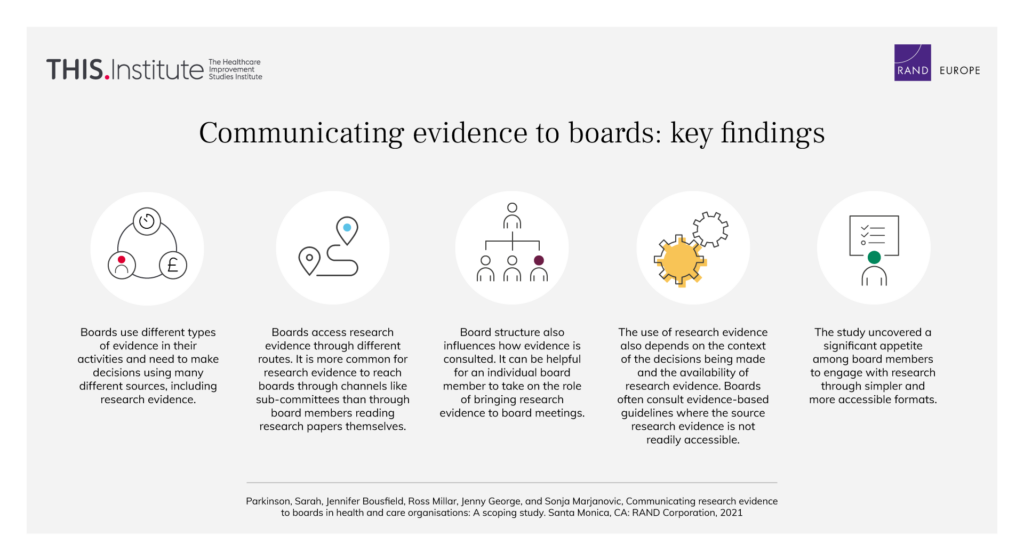Parkinson, Sarah, Jennifer Bousfield, Ross Millar, Jenny George, and Sonja Marjanovic, Communicating research evidence to boards in health and care organisations: A scoping study. Santa Monica, CA: RAND Corporation, 2021. https://doi.org/10.7249/RRA1267-1
Communicating research evidence to health and care governance boards
Why it matters
Boards in health and care organisations in England play a key role in their governance, strategy, direction, and culture. Their decisions should be informed by the best available evidence from a range of sources but understanding about how boards use research evidence is partial. This study set out to examine how NHS boards in England use research evidence to carry out their roles.
Approach
We worked together with RAND Europe and the Health Services Management Centre (HSMC) at the University of Birmingham to conduct a rapid scoping study on how NHS boards in England use research evidence, and what were the most effective ways of communicating evidence to them.
The study focused on NHS trust boards in England and the boards of Sustainability and Transformation Partnerships (STPs) or Integrated Care Systems (ICSs). A small, diverse range of NHS board members were interviewed to gain insight into the perceptions and experiences of people, as they relate to the use of research evidence, across a range of roles and circumstances. The findings are predominantly based on evidence from 17 interviews.
The study also considered whether and how research evidence was used by NHS boards in England in shaping their response to COVID-19.
What we found
The types of research evidence used by NHS boards are diverse, and include clinical research evidence, evidence from health services research and organisational and management research.
The board members who took part in the study said that they engaged with research in different ways and had differing views about the extent, and ways in which they used research evidence as part of their activities.
Several influences on the way boards used research were identified, relating to the nature of research evidence, the types of decisions being made, external circumstances that impacted decision making, and the function, structure and composition of boards.
The use of research evidence also depended on the context of decisions being made. During the COVID-19 pandemic, for example, NHS boards in England needed to make fast, practical decisions at a time when there was little research evidence available. Despite limited availability of evidence, they still relied on evidence-based guidelines around COVID-19 to make decisions, among other sources of knowledge and insight.
We found that NHS boards accessed research evidence through different routes, and although some said they engaged directly with research papers, it was more common for research to be fed back to the board through intermediary channels like sub-committees or through other organisational experts like clinical teams.
We also uncovered a significant appetite among board members to engage with research through simpler and more accessible formats. Examples they gave included presentations, bespoke workshops, seminars, summaries of research and discussion papers.




